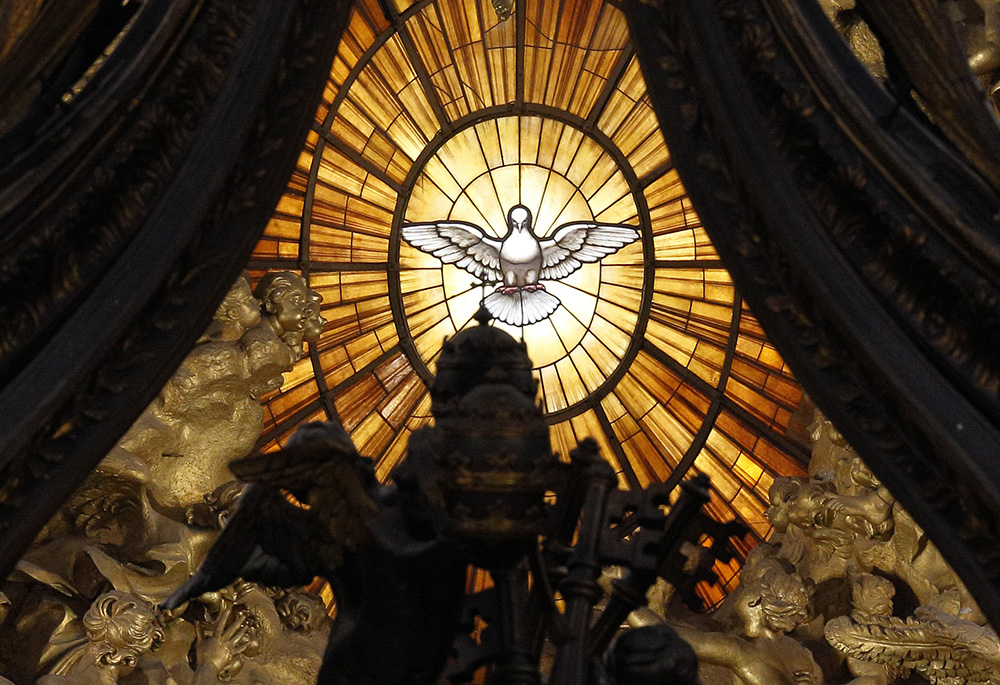
The Holy Spirit window is pictured through the Baldacchino in St. Peter's Basilica at the Vatican. (CNS/Paul Haring)
To encounter the divine in an intimate, transcendent way is not an experience reserved for certain people because they are faithful, pious, godly, virtuous or holy. An encounter with the mysterium tremendum is pure gift, initiated by the gift-giver, and meant to be transformative and informative for the recipient and the recipient's community.
The Jewish and Christian traditions have a long history of recording stories and texts that detail intimate, transcendent encounters between the transcendent one and human beings that happen often unexpectedly. Moses unassumingly was tending a flock of sheep when he saw a bush suddenly ablaze out of which came the voice of the divine calling him and commissioning him to the work of liberation on behalf of a group of indigenous, captive people. Hagar, a non-Israelite and a woman, encountered the divine in a desert and exclaimed, "Have I really seen El-Roi and lived?" Catherine of Siena, an unschooled doctor of the church, engaged in extensive, intimate dialogue with the divine out of which came an extraordinary theology reflective of her social location and medieval culture. Her exchanges are recorded in The Dialogue that attest to the presence of the living sacred one in her life and in the life of the world.
People who wish to categorize such encounters as "mystical" or "religious" experiences, labeling those who encounter the divine as "mystics," tend not to realize that the sacred one is forever present and self-revealing in the midst of all creation, among all people regardless of status, class, belief, orientation, gender, race, color, ability and age in ways that are sometimes extraordinary but more often ordinary. The theme of this Sunday's readings is encounter and intimacy.
The first reading from Acts features Stephen experiencing an encounter with the divine made possible through the gift of the Spirit. Although the reading records "Holy Spirit," not until post-biblical times did the construct of the Christian Trinity come into existence. Stephen encounters the glory of God and the risen Christ whom he sees standing at the "right hand" of God.
Is Stephen's experience an actual outward appearance of the divine? Probably not. Is it a vision? Probably so. Encounters with the divine affect all the internal faculties, allowing for things to be seen "in the mind's eye." Stephen's encounter sparks violent hostility among those who witness him speaking about and to the divine. He pays the extreme price of being prophetic. He is unjustly stoned to death, a punishment reserved for criminals. His death mirrors Jesus' death, and his prayer of forgiveness parallels Jesus' prayer at the time of the crucifixion.
Interestingly, this passage contains the image of the "right hand" that deserves to be unpacked. In the Bible, the "right hand" is preferred over the left hand. The "right hand" holds arrows, strokes the strings of lyres, extends special blessings and represents a place of honor. When associated with the deity, it shatters enemies and gains victories. The image of the "right hand," then, represents a bias imbedded not only in the text but also in past and present cultures.
Advertisement
The theme of divine encounter continues in the second reading from the Book of Revelation. In this story, John encounters the divine through an auditory experience. He bears witness to the existence of the Godhead and the Christ who present him with a message that he is to proclaim to his community. The message assures the community of the existence of the living Christ who desires an intimate and mutual relationship with all people, symbolized by wedding imagery embodied in the generic reference to the Spirit and the bride.
The Gospel picks up on the theme of encounter and intimacy. The story describes the beautiful unity existing between the Godhead and Jesus. In dialogue with the divine, Jesus expresses his desire for those whom he loves, namely, that they also share in the same divine oneness that he shares in with his God. This unity, based on and flowing from love, is the palpable presence of God that reveals God to the world and continues the mission of Jesus. It is a visible expression of God's love in the community and among its members that not only reveals something of the divine but also draws others to faith. The "glory" that will be revealed in and through the love of Jesus for his own is rooted in his love for the divine and the divine's love for him.
In sum, today's Gospel as well as the other readings for this Sunday invite us into a life of intimacy and encounter with the divine that deepens with time, a gift given not because of one's place or position in life but because of an abiding love that is forever self-revealing and distinctively unifying.







